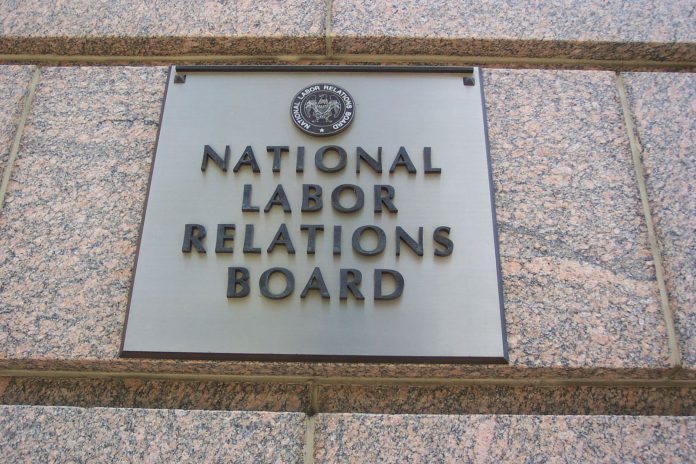

A set of labor rule changes could give workers more say in whether they want a union to represent them.
The National Labor Relations Board on Aug. 12 published proposed rules that it says will “protect employee free choice” regarding union representation. If finalized, the NLRB’s proposed rules would give workers greater leeway in certain situations to challenge union representation through a decertification petition. They would also remove unions’ ability to stymie decertification elections with so-called “blocking charges.”
Taken together, the changes tilt the scales against unions in situations when they might lack majority support among employees or a collective bargaining unit.
“There are few more important responsibilities entrusted to the NLRB than protecting the freedom of employees to choose, or refrain from choosing, a labor organization to represent them, including by ensuring fair and timely Board-conducted secret ballot elections,” said NLRB Chairman John Ring in a press release. “We believe that the changes we propose today further the goal of protecting this vital freedom.”
Blocking charges refer to unfair labor charges that a party files with the potential of postponing a union representation election. Unions are known to file them when facing a decertification election where employees could vote to oust them from the workplace. Under current policy, the NLRB would postpone the election until the charge is resolved. Now the NLRB will let the decertification election proceed as scheduled, except it will impound the ballots. If the union prevails on its unfair labor charge, the ballots will be tossed, but if the employer prevails, the ballots will be opened and counted.
Management-side attorneys say unions often use blocking charges to stall the election while they lobby the bargaining unit for support. As the NLRB notes in the proposed rule, its longstanding blocking charge policy “can preclude holding the petitioned-for election for months, or even years, if at all.”
A blocking charge is a “strategic move unions have used a lot of times in the past, especially if they thought the decertification wasn’t going their way,” said Michael Freimann, a shareholder at Brownstein Hyatt Farber Schreck and labor and employment attorney.
The charge often takes the form of an allegation that the employer is improperly involved the decertification or is trying to entice the employees with perks or benefits if they vote the union out, Freimann added.
Patrick Scully, a member in Sherman & Howard’s Denver office who represents employers, said in almost every one of his matters where a decertification petition was filed, the union has filed a charge. “It’s Pavlovian.” The ensuing investigation would postpone the vote, and sometimes the decertification process might fizzle out altogether, “defeating what was a legitimate decertification effort,” Scully said.
“The big takeaway” from the new rule, Freimann said, “is that it will allow employees a vote sooner, which is what they’re wanting to do when they’re filing a decertification petition in the first place.”
The second-most impactful rule change in the NLRB’s proposal would allow employees to more easily decertify union recognition when the employer has opted to recognize the union in lieu of an election. Employers sometimes use voluntary recognition when they’re already familiar with that particular union, and they expect the employees would vote the union in eventually anyway, Freimann said.
Since 2011, employees were barred from challenging the union’s recognition for at least a year, presumably to allow time for the union relationship to work. But the NLRB seeks reinstate the 2007 “Dana rule,” which would require employers to notify employees of the voluntary recognition and give them a 45-day window where they can file a decertification petition.
To get voluntary recognition, unions present evidence that they enjoy majority support from the bargaining unit, often in the form of authorization cards the employees sign. But that doesn’t necessarily mean the union would win an election if it were held, Scully said.
“With all due respect to the labor movement, sometimes employees sign those authorization cards without fully understanding what they’re signing and the repercussions of having their signatures on those cards,” Scully said. “A lot of employees sign an authorization card thinking that’s how they’re going to have an election.”
As far as employers are concerned, the proposed rule might make voluntary recognition less of a sure thing when they decide to go that route.
“I think unions and employers will want to be a little more cautious as to when they’re agreeing to voluntary recognition because employees will have a louder voice in what they think is best for them, and they get to utilize that voice in a much closer timeframe,” Freimann said.
The third and last change the NLRB proposed is limited to voluntary recognition in the construction industry. The National Labor Relations Act allows construction employers and unions to negotiate a collective bargaining agreement without the union without an election. Currently, the preliminary contract they sign can convert to a full collective bargaining agreement, but the rule change would require the union to show “extrinsic evidence” that the employer recognized it “based on a contemporaneous showing of majority employee support.”
While significant in election situations, the election rule proposal might be seen as an interim development on the way to the NLRB’s major upcoming rule changes. Freimann and Scully each said employers are eagerly anticipating the NLRB’s joint employer rule to be finalized, as well as new rule to determine how employers can restrict workers from using company property for personal purposes.
In the latter case, the NLRB has shown signs it will reverse its landmark decision in Purple Communications, in which it said the National Labor Relations Act guarantees employees the right to use company email systems even when employers had neutral rules restricting them from doing so. A year ago, the NLRB invited public briefs on whether it should overturn the 2014 decision, and a proposed rule taking that feedback into account might not be far off.
— Doug Chartier

